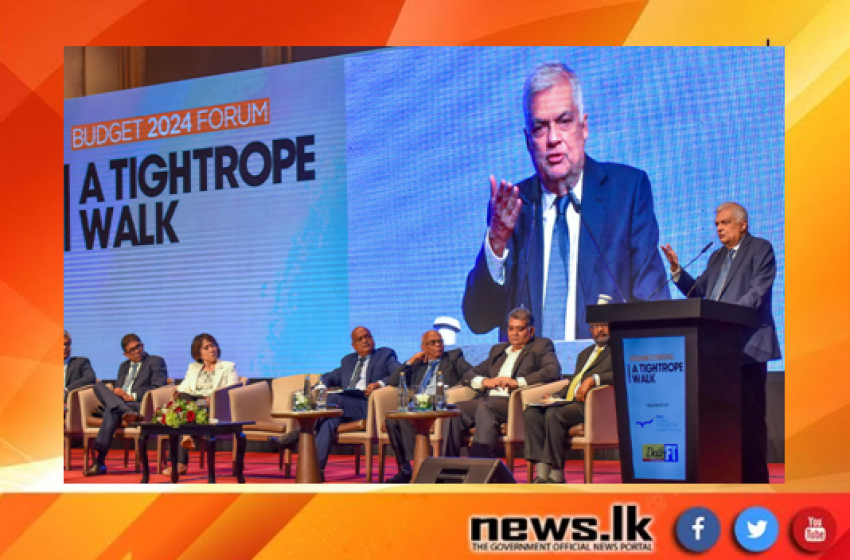President Ranil Wickremesinghe addressing the Budget 2024 Forum under the theme A Tightrope Walk organised by the Colombo University MBA Alumni Association stressed the importance of Sri Lankan universities being world-class and acknowledged the challenge of balancing financial considerations with the goal of providing quality education. He presented a broader perspective on the budget, drawing inspiration from President Roosevelt’s New Deal approach, emphasizing the need for a comprehensive strategy beyond a traditional budget.
The President in his capacity as the Finance Minister highlighted efforts to stabilize and reconstruct the economy, including negotiations with the IMF and bilateral discussions, aiming for positive results in December.
Delivering the keynote address at this event held at the Shangri La Hotel in Colombo, the President defended the budget as more focused on building a new economy that benefits the people rather than being labelled as an election budget. He discussed pay increases for government servants, adjustments in the private sector and increased expenditure on social programs like Samurdhi and support for SMEs. He underscored the importance of paying for quality government services while ensuring assistance for those who cannot afford it.
President Wickremesinghe revealed a significant three-fold increase in Aswesuma benefits in the budget as part of a new social construct. He also acknowledged the extensive nature of the country’s current crisis, adding that it surpasses the government’s capacity to address it within a single budget. He stressed the importance of adaptation, highlighting the necessity for embracing change and emphasized that this commitment to change is the direction the government is currently heading.
In this comprehensive address, the President outlined key initiatives, including the largest privatization in Sri Lanka, granting 2 million acres to the people and converting permit holders into land owners. The President emphasized the dispersal of ownership and wealth among the population, aligning with constitutional principles. Additionally, plans for partial privatization of banks was also discussed, with a focus on employee and depositor participation. President Wickremesinghe highlighted the importance of a highly competitive and digitized economy, urging private sector involvement. He outlined goals for digitalization and discussed the privatization of Sri Lanka Telecom.
Energy transformation was also emphasized, with a focus on green energy, setting the stage for Sri Lanka to lead in this area. The address also covered plans for agriculture modernization, particularly in the dry zone and the expansion of fisheries. Tourism was identified as a potential growth sector, with an aim to attract 5 million tourists at a targeted rate.
President Wickremesinghe also outlines diverse areas of focus for economic development. Acknowledging the need for competitiveness in manufacturing, he discusses engagements with India, RCEP, ASEAN countries and the EU. Recognizing challenges in competing with mass-producing countries like Bangladesh and emerging economies, the President advocated for a leapfrog approach and emphasized the importance of education reform to support economic shifts.
A comprehensive change in the education system was revealed, with a 10-year timeline and a focus on opening new universities, including collaboration with India for an IIT campus in Kandy. The President highlighted the potential for regional logistics by developing Sri Lanka as a hub, particularly focusing on the main port and potential developments in Trincomalee. He noted that the goal is to reorient the economy to achieve a modern economy by 2030-2035.
President Wickremesinghe emphasized that the budget is just one part of the broader economic plan, discussing the need for periodic statements and new laws to address the evolving economic landscape. Stressing the importance of change, the Minister encouraged collaboration with the private sector, foreign assistance and retired professionals to overcome implementation challenges and mobilize the country for economic progress. The President also placed the onus on the collective willingness to move forward, acknowledging that without such commitment, the government’s role is limited.
The members of the panel at this forum were Mr Mahinda Siriwardana – Secretary to the Treasury, Dr. Nandalal Weerasinghe, Ms Chiyo Kanda – Country Manager World Bank Sri Lanka and Maldives, Mr W.A. Wijewardena – Former Deputy Governor of the Central Bank, Mr Kulendran Sivaram – President of the Colombo University MBA Alumni Association, Mr. Bingumal Thewarathanthri – CEO Standard Chartered Bank, Sri Lanka, Mr Krishan Balendra – Chairperson John Keels Holdings PLC, Mr Channa Manoharan – Country Managing Partner, Deloitte, Sri Lanka and Maldives, the Moderator, Mr Nisthar Cassim – Editor/CEO, Daily FT and several other dignitaries.
PMD




















